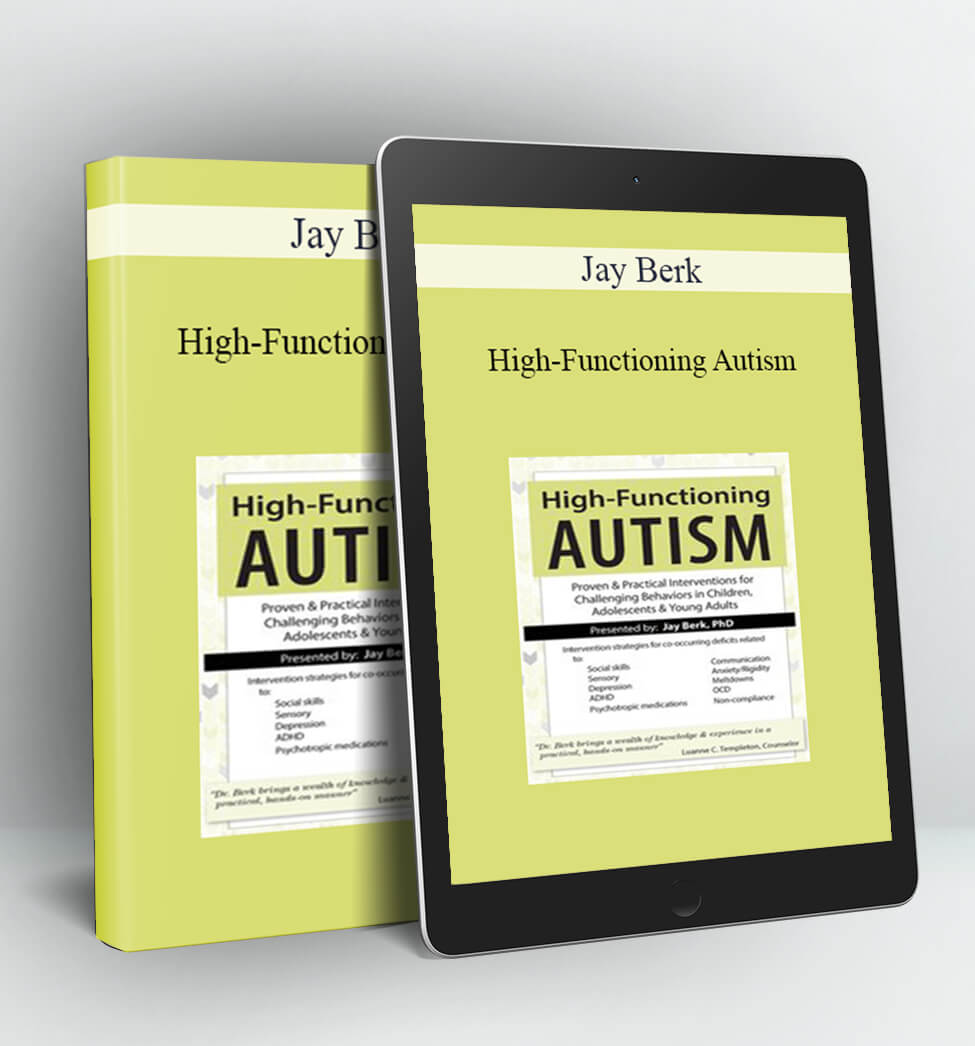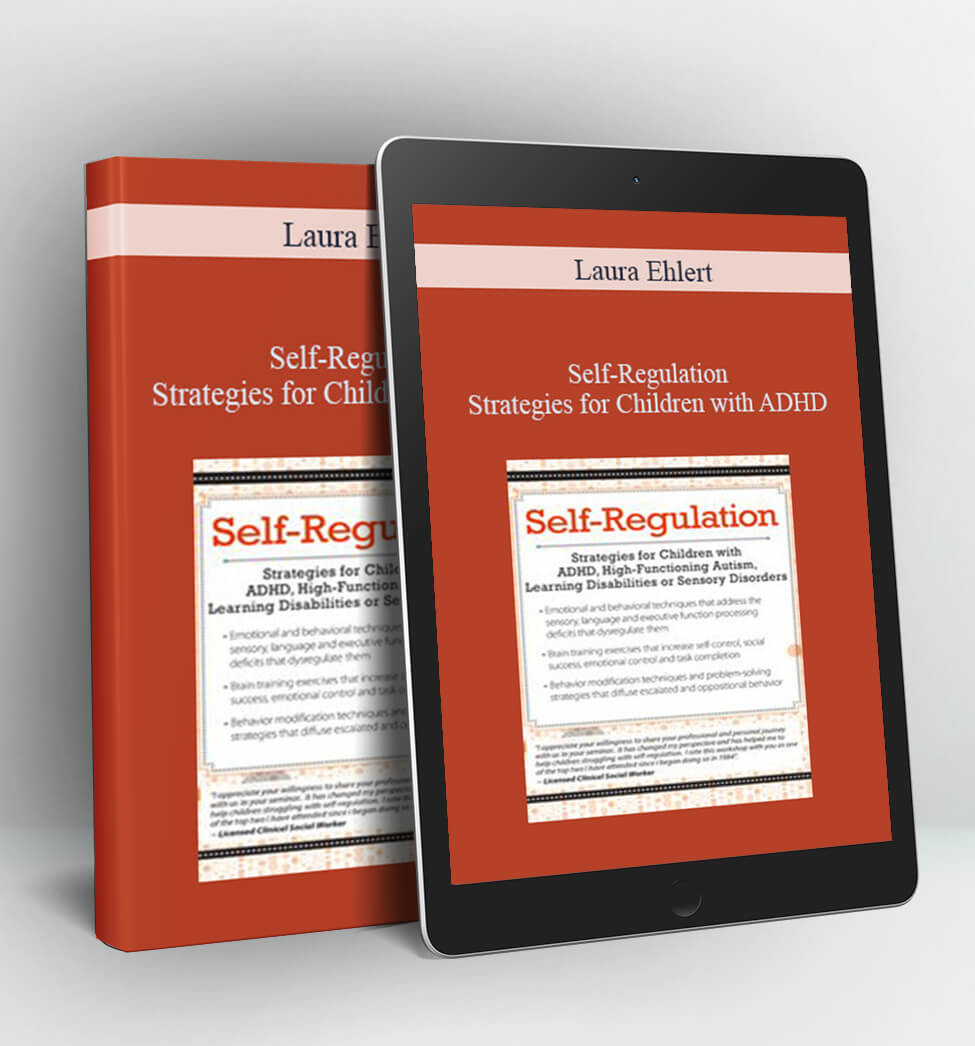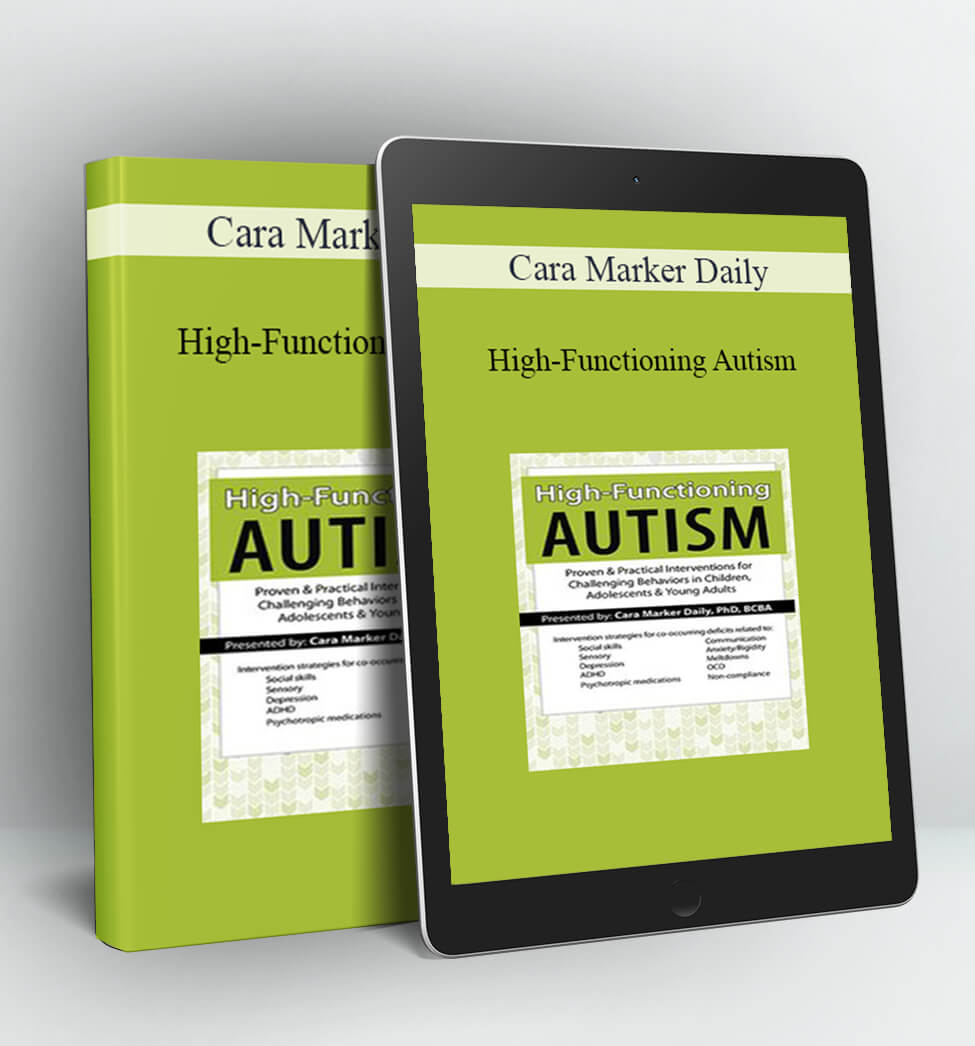
High-Functioning Autism – Jay Berk
- Faculty:
- Jay Berk
- Duration:
- 6 Hours 15 Minutes
- Format:
- Audio and Video
- Copyright:
- Apr 18, 2018
Description
Intervention strategies for co-occurring deficits related to:
- Social skills
- Communication
- Sensory
- Anxiety/Rigidity
- Depression
- Meltdowns
- ADHD
- OCD
- Psychotropic medications
- Non-compliance
This intensive seminar provides proven intervention strategies, essential treatment tools, and behavioral techniques to help you analyze behaviors and actions, identify consequences for behaviors, and teach new skills to children, adolescents and young adults with high-functioning autism (HFA). Walk away with practical intervention techniques for social success, behavior changes and overcoming challenging co-occurring behaviors that deliver success through adulthood. The challenging co-occurring issues to be addressed are:
- Social skills
- Communication
- Sensory
- Anxiety/Rigidity
- Depression
- Meltdowns
- ADHD
- OCD
- Psychotropic medications
- Non-compliance
Gain valuable insight into common psychotropic medications, including both the helpful effects and potentially problematic side effects, that these individuals are prescribed. We will explore HFA and the new DSM-5® diagnosis of Social-Pragmatic Communication Disorder. You will receive the necessary tools to gain effective collaboration between clinicians, educators and parents. Through case studies, video clips and class participation you will leave this seminar with the confidence to identify actions that cause impediments in change, utilize more successful consequences for behaviors, and teach new skills to children, adolescents, and young adults with HFA. Don’t just manage these individuals; provide interventions that can lead to successful independence into their adult years!
Handouts
| Manual 030070 (1.90 MB) | 59 Pages | Available after Purchase | |
| Instructions for ASHA Credit – SELF STUDY ONLY – 04/18/18 (0.03 MB) | Available after Purchase |
Outline
- DSM-5® and ICD-10 Updates
- Social-Pragmatic Communication Disorder
- Impact on service delivery (school/community)
- Successfully link home, school and therapy
- IEP/504/Do they qualify for school services?
- Co-morbid disorders: Why the difference is important
- Social Skills Interventions
- Improve social skill deficits
- “Kid Cop” behaviors and why other kids get angry
- How to get peers to recognize them in positive ways
- Group activities
- Early intervention programs that can deliver long-term success
- Communication Interventions
- Conflict resolutions that are effective in multiple settings
- Help peers and family members relate
- Verbal interventions that overload processing
- Pragmatic language and other abstract issues
- Sensory Interventions
- Self-stimulation (appropriate & inappropriate)
- Sensory strategies to avoid
- Coping/calming techniques that reduce meltdowns
- Sensory diet
- Anxiety Interventions
- Anxiety-reducing activities
- How anxiety impacts rigidity
- Help them “self-regulate”
- Successful transitions
- Depression Interventions
- Impact on flexibility and change
- Therapy that works for people with HFA
- Emergence in adolescence
- Solitude vs. loneliness
- ADHD Interventions
- ADHD vs. hyper-focus
- Commonly prescribed medications and possible benefits and side effects
- Specific triggers and what fuels the rage
- Reduce aggressive and disruptive behaviors
- Mistakes that escalate defiant behaviors
- Overcome refusals to comply with even simple requests
- Obsessive-Compulsive Disorder (OCD) Interventions
- What to do when they become stuck on high interest areas
- Specific medication interventions
- Impact on socialization and behaviors
- Interventions for Specific Difficult Behaviors
- Reduce Internet and electronic addictions
- Changes in technology, school systems and mental health delivery
- Cognitive-Behavior Therapy (CBT) for mood and anxiety
- Psychopharmacological Interventions
- Differentiate among common medications
- Medications that mimic difficult behaviors
- Side effects and off label use
- Case Studies, Demonstrations & Activities
- Case studies that demonstrate specific interventions for aggressive and non-compliant behaviors
- iPad® apps for social success, behavioral changes and speech and language
- Staff training techniques to experience what an individual on the spectrum might
Faculty

Jay Berk, PhD Related seminars and products: 6
Jay Berk, Ph.D., is a licensed clinical psychologist and an internationally recognized expert in the child/adolescent behavioral field who brings both a clinical and education perspective to his work with children, adolescents and their families. For over 25 years, Dr. Berk has been treating clients with ODD, ADHD, autism, anxiety and stress, depression, learning disabilities, Tourette’s Syndrome and individuals who have multiple impairments. He conducts 15 social skills/mental health groups for children and adolescents and works daily with school and community professionals, families and parents. Dr. Berk continually consults for several school districts. In his private practice, in Beachwood, Ohio, he provides therapy for children, adolescents, families, testing and evaluation, school consultation as well as an alternative educational program.
Dr. Berk presents nationally on the topics of autism, disruptive behavior disorders, mental health issues in the classroom, ODD and social skills competency. In his workshops, he teaches professionals who work with children and adolescents, practical treatment and intervention strategies. He has been invited to present at hundreds of schools and conferences including being a repeated consultant to the Department of Education in Hawaii. As a past consultant to the United Nations, Dr. Berk authored a manual for UNICEF that was used by teachers working with children throughout Bosnia during the war. He has also worked in London, England with defiant teenagers; Kristiansand, Norway with traumatized youth; and the American Red Cross with trauma response.
Speaker Disclosures:
Financial: Dr. Jay Berk maintains a private practice. He receives a speaking honorarium from PESI, Inc.
Non-financial: Dr. Jay Berk is a member of the American Psychological Association.
Access Download High-Functioning Autism – Jay Berk right now!
Delivery Method:
After your purchase, you’ll get access to the downloads page. Here, you can download all the files associated with your order.
Downloads are available once your payment is confirmed, we’ll also send you a download notification email separate from any transaction notification emails you receive from Coursedownloads.










